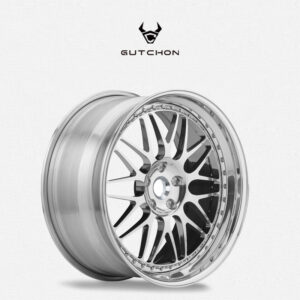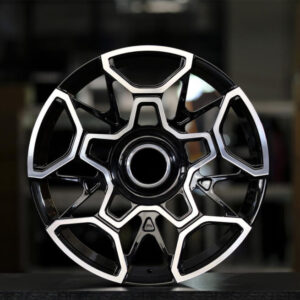The wheel is an important part to carry the car, and the good or bad of the wheel directly affects the safety and performance of the car. There are a wide variety of wheels on the market, different materials, different processes, how to choose the right wheel for you?
First, let’s talk about the material. Low-end cars mostly use steel wheels, which are often referred to as iron wheels. Steel wheels have the advantage of high-cost performance, not only the manufacturing process is simple, low production costs, and high strength, strong resistance to metal fatigue, not easy to deformation. However, there are also the disadvantages of heavy weight and high inertia resistance, coupled with the poor thermal conductivity of steel and the requirement for strength, the hollow area of steel wheels cannot be too large, which will have a greater impact on the performance of the brakes and heat dissipation. In addition, steel wheels have a fatal flaw, that is, due to the use of environmental and wear and tear factors, rust may occur, resulting in serious driving safety hazards. In addition, the appearance of steel wheels looks rough, which will destroy the overall aesthetics of the vehicle, so many car owners will replace the steel wheels with aluminum wheels if their budget allows.
Aluminum wheels are now more common wheels on the market, with the advantages of lighter weight, better thermal conductivity, and higher strength to meet the needs of various more sophisticated shapes. Although the cost is higher than steel wheels, the superior performance improvement makes it worthwhile, and the mature process and commercial mass production also make the price of aluminum wheels acceptable to manufacturers and the public.
Magnesium alloy wheels are hardly seen on a regular basis and are generally only equipped for supercars. Lightweight is its great advantage, the overall weight is only about one-third of the same volume of aluminum wheels. But the expensive price and easy corrosion characteristics make it temporarily unable to become a popularized option.
Lastly, carbon fiber wheels are a popular word among tuning enthusiasts, as this material is closely associated with “lighter” and “stronger”, but also inescapably means “more expensive”. “Burning money”. When a car uses carbon fiber wheels, it means that “cost” is not a word worth considering in the eyes of the car’s owner.
After talking about the material, let’s talk about the process, the same material of the wheel, using different manufacturing process also has the same high and low. Common aluminum wheels are divided into two main categories: “forging” and “casting”, which are also two familiar words to tuning car enthusiasts.
Casting is also divided into gravity casting and low-pressure casting. Gravity casting is the most traditional casting method, the aluminum alloy melt is poured into the mold, and then polished and processed after it cools and forms.
Low-pressure casting is the use of air pressure to let the molten metal rise smoothly to fill the mold and molding, this way to reduce the entry of impurities and the generation of bubbles, and make the solidification more uniform, to achieve dense complementary shrinkage. It also meets the requirements of high strength and light weight, and keeps the cost under control, which is a model of good quality and low cost.
Forging is to apply pressure to the metal embryo, directly pressed into shape, compared to low-pressure casting can achieve higher strength, lighter weight, and shape to meet more personalized needs, but the yield is lower, the cost is much higher than casting wheels, belongs to the higher-end needs.
In addition, there is a spinning process, the first low-pressure casting method to cast a flat wheel rough embryo, and then use the spinning process stretch molding, metal extrusion after the internal molecular arrangement changes, higher strength, comparable to the degree of forging wheels, while the cost is much smaller than forging wheels, and the weight is much lighter than traditional casting wheels.
So if we don’t consider the cost and price, the ranking of aluminum wheels for regular manufacturers is generally forged wheels > spun wheels > low-pressure casting > gravity casting.
Kevyet taotut vanteemme:

2 kpl taotut pyörät

taotut suorituskykyiset pyörät
